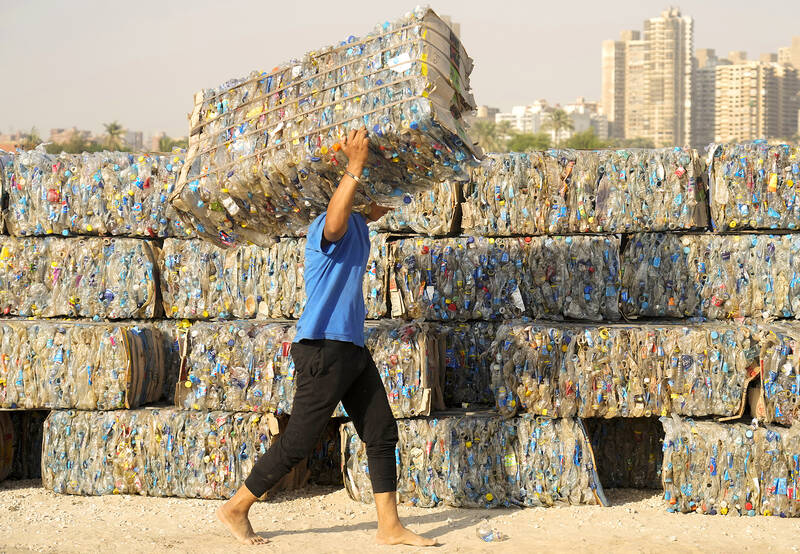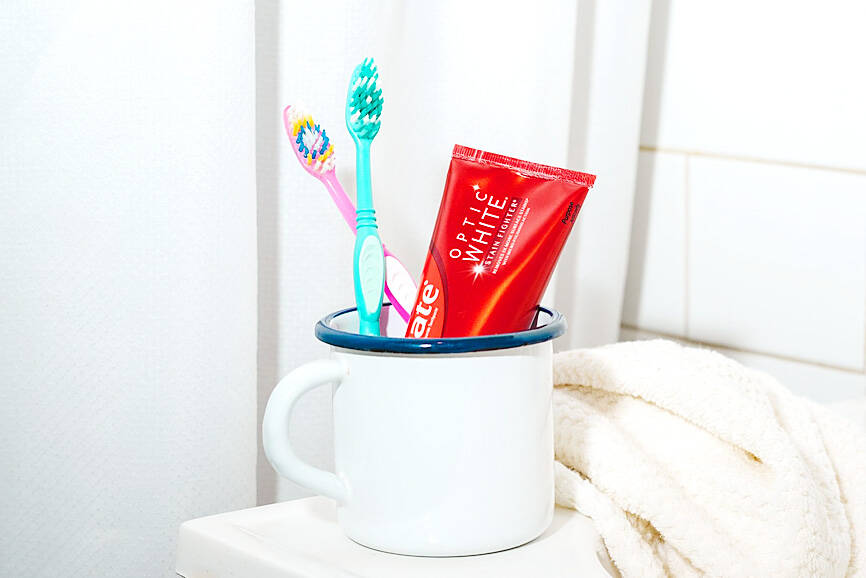Colgate-Palmolive Co spent years devising a recyclable toothpaste tube. Pulling it off was a technical masterstroke, substituting plastic for a mix of materials that was historically tough to reclaim. The result was “nice squeezability,” one executive said.
One big problem remains: Many sorting centers in the US and elsewhere do not accept them.
The gap between Colgate’s engineering success and the practicalities of where-do-we-toss-our-empties underscores a persistent challenge for the corporate US: Switching to packaging that can bypass landfills is not enough if there is no easy way to recycle it. In Colgate’s case, that is 9 billion tubes a year requiring extra effort to avoid the trash heap.

Photo: AP
The new tubes, which cover 78 percent of the company’s US toothpaste lineup, are made with high-density polyethylene (HDPE), the recyclable plastic used for products such as milk jugs.
In the fragmented US system, however, companies making recyclable products have to persuade a wide range of stakeholders, from local governments to private companies, to accept the items, sort them and turn them into something new. It is a process that can take years. The tubes are still not classified as recyclable by How2Recycle, an organization that issues standardized labels with instructions on how to dispose of packaging.
Goods eligible for collection vary by community, and an estimated 40 million US households do not have access to recycling services from their homes. This all means that plastics get reclaimed at rates of only 8 to 28 percent, depending on the type.

Photo: Bloomberg
In light of the challenge, Colgate said it has engaged players across the supply chain for years. It has also shared its new tube design with other companies, and said competitors would adopt similar recyclable plastic tubes by 2025.
“It is not easy work, given the many aspects of the process, but we are committed, and we believe we are on the right path,” Colgate said.
The company has pledged to shrink its plastic waste and use “100 percent recyclable, reusable or compostable plastic packaging by 2025,” it said.
Sarah Dearman, chief innovation officer at the Recycling Partnership, an industry-funded group working to improve the system, said the new tubes are “a great step.”
However, consumers must also have access to collection systems that accept the tube.
It is not clear how many do, nationwide assessment by the Sustainable Packaging Coalition, an industry working group said.
Colgate said the tube has a third-party certification showing it can be processed alongside HDPE bottles, which 87 percent of Americans can put in recycling bins.
That type of plastic ends up being recycled nearly 30 percent of the time, one of the highest rates among recyclable materials in the US.
However, Colgate said that acceptance might still be limited and advised consumers to check with local community programs.
The company started updating the artwork on its boxes to provide more information.
Some consumers are taking note.
Ethan Helvering, a tech worker living in Los Angeles, said he was looking for sustainable toothpaste alternatives when he stumbled upon Colgate’s new tube. He sees recyclability as a selling point and is glad to see the company’s efforts, although he has questions about what ultimately happens.
“If there’s an option to put something in the recycling, I’ll do it,” Helvering said. “Hopefully processes improve and at some point it becomes an actual reality.”
Colgate’s new tubes usually get sorted to the correct group once they reach plants that recover materials and bundle similar plastics together, a test commissioned by the company showed.
However, most US recovery facilities do not take tubes because the recyclable and traditional versions are so similar, said Sandeep Kulkarni, a technical consultant at the Association of Plastic Recyclers, a trade group.
The old tubes could cause contamination if consumers put them in the recycling bin, so it is still easier for recycling facilities to reject toothpaste tubes across the board, he said.
Waste Management Inc, which offers recycling and disposal services, said the tubes are not in its list of acceptable items.
Another concern is leftover toothpaste causing contamination, said Pete Keller, an executive at waste disposal company Republic Services Inc.
It is another area that seems to have discrepancies: On its Web site, Colgate says any residual toothpaste in the tubes is removed during the rinsing process at recycling facilities.
Together, Waste Management and Republic Services run about one-quarter of US materials-recovery facilities tracked by the Recycling Partnership, which said processing capacity is also an important factor.
Sander Defruyt, who leads a plastics-reduction initiative at the Ellen MacArthur Foundation, said that given the challenges of recycling, companies should invest more in alternatives such as reusable containers and packaging.

MULTIFACETED: A task force has analyzed possible scenarios and created responses to assist domestic industries in dealing with US tariffs, the economics minister said The Executive Yuan is tomorrow to announce countermeasures to US President Donald Trump’s planned reciprocal tariffs, although the details of the plan would not be made public until Monday next week, Minister of Economic Affairs J.W. Kuo (郭智輝) said yesterday. The Cabinet established an economic and trade task force in November last year to deal with US trade and tariff related issues, Kuo told reporters outside the legislature in Taipei. The task force has been analyzing and evaluating all kinds of scenarios to identify suitable responses and determine how best to assist domestic industries in managing the effects of Trump’s tariffs, he

TIGHT-LIPPED: UMC said it had no merger plans at the moment, after Nikkei Asia reported that the firm and GlobalFoundries were considering restarting merger talks United Microelectronics Corp (UMC, 聯電), the world’s No. 4 contract chipmaker, yesterday launched a new US$5 billion 12-inch chip factory in Singapore as part of its latest effort to diversify its manufacturing footprint amid growing geopolitical risks. The new factory, adjacent to UMC’s existing Singapore fab in the Pasir Res Wafer Fab Park, is scheduled to enter volume production next year, utilizing mature 22-nanometer and 28-nanometer process technologies, UMC said in a statement. The company plans to invest US$5 billion during the first phase of the new fab, which would have an installed capacity of 30,000 12-inch wafers per month, it said. The

Taiwan’s official purchasing managers’ index (PMI) last month rose 0.2 percentage points to 54.2, in a second consecutive month of expansion, thanks to front-loading demand intended to avoid potential US tariff hikes, the Chung-Hua Institution for Economic Research (CIER, 中華經濟研究院) said yesterday. While short-term demand appeared robust, uncertainties rose due to US President Donald Trump’s unpredictable trade policy, CIER president Lien Hsien-ming (連賢明) told a news conference in Taipei. Taiwan’s economy this year would be characterized by high-level fluctuations and the volatility would be wilder than most expect, Lien said Demand for electronics, particularly semiconductors, continues to benefit from US technology giants’ effort

‘SWASTICAR’: Tesla CEO Elon Musk’s close association with Donald Trump has prompted opponents to brand him a ‘Nazi’ and resulted in a dramatic drop in sales Demonstrators descended on Tesla Inc dealerships across the US, and in Europe and Canada on Saturday to protest company chief Elon Musk, who has amassed extraordinary power as a top adviser to US President Donald Trump. Waving signs with messages such as “Musk is stealing our money” and “Reclaim our country,” the protests largely took place peacefully following fiery episodes of vandalism on Tesla vehicles, dealerships and other facilities in recent weeks that US officials have denounced as terrorism. Hundreds rallied on Saturday outside the Tesla dealership in Manhattan. Some blasted Musk, the world’s richest man, while others demanded the shuttering of his